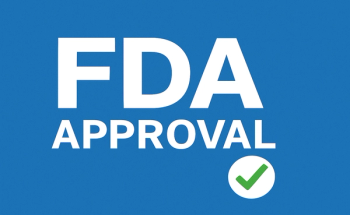
Study Summary: Osimertinib Versus Standard EGFR-TKI Therapy in Patients With EGFR-Mutated Advanced NSCLC and Brain Metastases at Baseline
Background
Brain metastases are common in patients with advanced non-small cell lung cancer (NSCLC), and the presence of brain metastases is associated with decreased quality of life and reduced overall survival. For patients with advanced epidermal growth factor receptor (EGFR)-mutated NSCLC, treatment with first-generation (gefitinib) or second-generation (erlotinib) EGFR-tyrosine kinase inhibitors (TKIs) decreases the risk of central nervous system (CNS) progression compared with chemotherapy. Because neither gefitinib nor erlotinib adequately penetrate the blood-brain barrier, the CNS activity of these TKIs is considered suboptimal. CNS disease progression occurs in up to 40% of patients with advanced EGFR-mutated NSCLC; thus, there is an unmet need for treatments that more readily cross the blood-brain barrier.1
Preclinical data suggest that the third-generation EGFR-TKI osimertinib may better penetrate the CNS and that this could translate to improved efficacy. The phase 3, randomized, double-blind FLAURA trial compared osimertinib with standard EGFR-TKI therapy as first-line therapy for patients with advanced EGFR-mutated NSCLC. A preplanned, exploratory analysis of data from the FLAURA trial compared the CNS efficacy of osimertinib versus standard EGFR-TKI therapy (gefitinib or erlotinib) as first-line therapy for patients with EGFR-mutated advanced NSCLC who had CNS metastases at baseline.1
Study Design
Two hundred patients in the FLAURA trial had baseline brain scans. Of these, 128 patients (osimertinib, n = 61; standard EGFR-TKI therapy, n = 67) had CNS metastases (measurable and/or nonmeasurable) at baseline and were included in the CNS full-analysis set. The CNS evaluable-for-response set included 41 patients (osimertinib, n = 22; standard EGFR-TKI therapy, n = 19) who had at least 1 measurable CNS lesion at baseline. The primary end point in this preplanned, exploratory analysis was CNS progression-free survival (PFS). Other end points included CNS objective response rate (ORR), CNS duration of response, CNS disease-control rate, CNS tumor shrinkage, and risk of CNS progression.1
Results
Baseline Characteristics
Baseline demographics were similar between the 2 treatment groups and consistent with the overall population of patients in the FLAURA trial. Baseline CNS tumor size was, however, numerically larger in patients randomized to standard EGFR-TKI therapy compared with those randomized to osimertinib (29 mm vs 16 mm).1
Efficacy
CNS PFS and Risk of Progression
Median follow-up for CNS PFS was 12.4 months with osimertinib and 7.0 months with standard EGFR-TKI therapy. In the CNS full-analysis set, CNS PFS was significantly improved with osimertinib versus standard EGFR-TKI therapy (P = .014). Median CNS PFS was not reached with osimertinib and was 13.9 months with standard EGFR-TKI therapy. CNS progression was less commonly reported with osimertinib compared with standard EGFR-TKI therapy (20% vs 39%). CNS progression due to the occurrence of new CNS lesions was also less commonly reported with osimertinib compared with standard EGFR-TKI therapy (12% vs 30%).1
CNS Response
In the CNS full-analysis set, ORR was significantly improved with osimertinib compared with standard EGFR-TKI therapy (66% vs 43%; P = .011). The CNS disease-control rate did not differ significantly between the 2 treatment groups (90% vs 84%). Forty patients who received osimertinib had an objective response (complete response, n = 25; partial response, n = 15); 29 patients who received standard EGFR-TKI therapy had an objective response (complete response, n = 16; partial response, n = 13). Median time to response was 6 weeks with osimertinib and 12 weeks with standard EGFR-TKI therapy. Median CNS duration of response was not reached with osimertinib and was 14.4 months with standard EGFR-TKI therapy.1
In the CNS evaluable-for-response population, neither ORR nor disease-control rate differed significantly between the 2 treatment groups. Median time to response was 6 weeks with both osimertinib and standard EGFR-TKI therapy. Median CNS duration of response was 15.2 months with osimertinib and 18.7 months with standard EGFR-TKI therapy.1
Compared with baseline, fewer osimertinib-treated patients and more standard EGFR-TKI-treated patients had CNS lesions at data cutoff.1
Safety
The rates of adverse events (AEs) were similar between the CNS full-analysis set and the overall FLAURA population.1 The results of the FLAURA study (overall population) were previously reported by Soria et al in the New England Journal of Medicine.2 In the overall population, grade ≥3 AEs were reported less frequently with osimertinib compared with the standard EGFR-TKI group (34% vs 45%). The most commonly reported all cause AEs included rash/acne (osimertinib, 58%; standard EGFR-TKI group, 78%), diarrhea (osimertinib, 58%; standard EGFR-TKI group, 57%), and dry skin (36% in each group).2
Conclusion
Improved CNS efficacy outcomes were observed with osimertinib versus standard EGFR-TKI therapy in patients with EGFR-mutated NSCLC and brain metastases. The probability of experiencing CNS progression was lower with osimertinib compared with standard EGFR-TKI therapy.1
References
1. Reungwetwattana T, Nakagawa K, Cho BC, et al. CNS response to osimertinib versus standard epidermal growth factor receptor tyrosine kinase inhibitors in patients with untreated EGFR-mutated advanced non-small-cell lung cancer [published online August 28, 2018]. J Clin Oncol. 2018:Jco2018783118. doi: 10.1200/JCO.2018.78.3118.
2. Soria JC, Ohe Y, Vansteenkiste J, et al; FLAURA Investigators. Osimertinib in untreated EGFR-mutated advanced non-small-cell lung cancer. N Engl J Med. 2018;378(2):113-125. doi: 10.1056/NEJMoa1713137.
Newsletter
Stay ahead of policy, cost, and value—subscribe to AJMC for expert insights at the intersection of clinical care and health economics.







